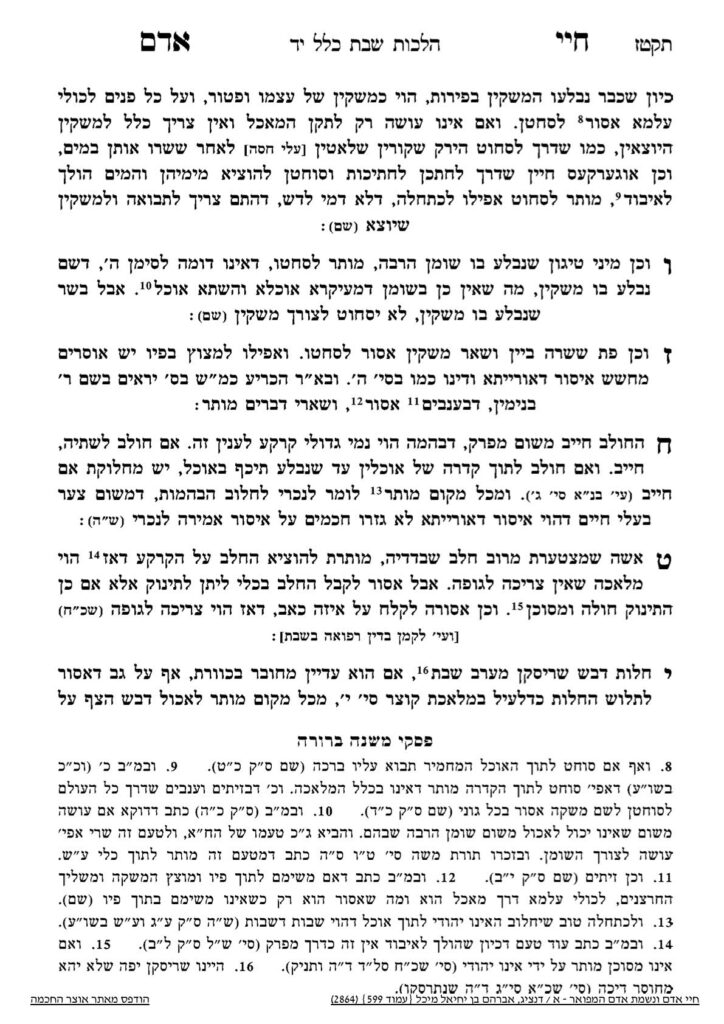We are continuing in siman 8, discussing choleiv (milking), which is a toldah of dosh. We left off with the psak of the Chayei Adam, who wrote that a Jew should not milk a cow on their own on Shabbos, but that it is muttar to ask a non-Jew to milk the cow. The Chayei Adam explained that Chazal did not extend the issur of amira l’achum to a case of tzaar baalei chaim, which is an issur deoraysa.
Today, we will clarify
- A) which issurei derabanan Chazal permitted due to tzaar baalei chaim, and
- B) the idea that tzaar baalei chaim is an issur deoraysa.
- 1. All poskim agree that amira l’achum is muttar in order to alleviate tzaar baalei chaim. Amira l’achum is an issur derabanan, and has an advantage as a unique issur derabanan in that the Jew is only performing dibbur (speech) and not any action. Therefore, the Gemara refers to amira l’achum as ein bo maaseh, something which is not accompanied by an action, and therefore it is muttar for the purpose of tzaar baalei chaim.
- The Mishnah Berurah discusses moving muktzah for the purpose of alleviating tzaar baalei chaim. Muktzah is also unique, in that it is a gezeira out of concern that the spirit of Shabbos will be undermined. It is not considered a melacha derabanan in the sense that it is not the derabanan version of a melacha deoraysa (eg, a melacha deoraysa performed with a shinui). It is a machlokes whether muktzah is muttar for the purpose of tzaar baalei chaim, and the Mishnah Berurah is inclined it is assur. The Chazon Ish is on record that it is muttar.
- Regarding performing an actual melacha derabanan for the purpose of alleviating tzaar baalei chaim, such as performing a melacha deoraysa with a shinui, the Mishnah Berurah paskens it is assur to perform the melacha even if the animal will die.
- 1. We need to clarify that parameters of tzaar baalei chaim being an issur deoraysa. The Gemara in Bava Metzia discusses a case of an animal which is overburdened and cannot stand up. The Gemara discusses whether relieving the animal of its burden is an issur deoraysa or an issur derabanan. The Gemara brings the pasuk regarding helping unburden an animal in such a situation, which would seem to be a clear indication it is an issur deoraysa, but concludes that it may not be a sufficient proof.
- The Rambam writes that that tzaar baalei chaim is an issur deoraysa. The Rambam proceeds to bring the story of Bilam’s animal speaking to him as a source that tzaar baalei chaim is deoraysa. However, the Gemara in Bava Metzia does not bring the pasuk of Bilam’s animal, and the Gemara itself does not conclude either way about the nature of the issur.
- The achronim understand that the Rambam refers to actively paining the animal. The Gemara in Bava Metzia refers to an animal which is in pain, but not due to any action on the part of the person in question, and the discussion in the Gemara is whether one is chayav mideoraysa to help the animal or not. The Gemara is not conclusive in this case, and this case has nothing to do with the pasuk about Bilam’s animal, where Bilam was actively causing his animal pain. In the Gemara, it could be that the mitzvah of unburdening the animal is no different than the mitzvah of helping another person load their animal, where the purpose of the help is the chesed of helping the owner, and not the tzaar of the animal itself.
- Nevertheless, the Chayei Adam is on record that our case, where the animal is in pain due to an excess of milk, is an issur deoraysa. If so, the Chayei Adam holds that even a case of passive tzaar baalei chaim is deoraysa.
- The Chayei Adam holds mashkeh ba la’ochel is not a heter for milking. However, one may ask a non-Jew to milk the cow.
- It is assur mideoraysa to actively cause pain to an animal.
- Passively allowing the animal to be in pain is assur, but may only be derabanan.
- It is muttar to perform amira l’achum and to move muktza in order to alleviate tzaar baalei chaim,
- but it is assur to perform a melacha derabanan. Obviously, it is assur to perform a melacha deoraysa.



